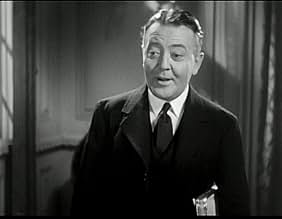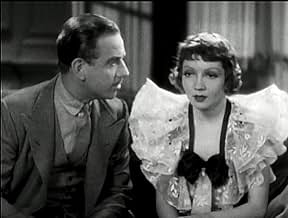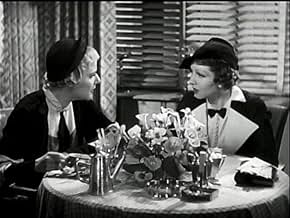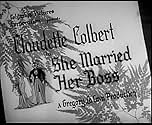AVALIAÇÃO DA IMDb
6,5/10
758
SUA AVALIAÇÃO
Adicionar um enredo no seu idiomaAn efficient secretary at a department store marries her boss, but discovers that taking care of him at home is a lot different to taking care of him at work.An efficient secretary at a department store marries her boss, but discovers that taking care of him at home is a lot different to taking care of him at work.An efficient secretary at a department store marries her boss, but discovers that taking care of him at home is a lot different to taking care of him at work.
Grace Hayle
- Agnes Mayo
- (as Grace Hale)
Ernie Adams
- Passerby
- (não creditado)
William Arnold
- Department Head
- (não creditado)
Lynton Brent
- Assistant Window Dresser
- (não creditado)
Edmund Burns
- Newspaper Photographer
- (não creditado)
A.S. 'Pop' Byron
- Store Watchman
- (não creditado)
- Direção
- Roteiristas
- Elenco e equipe completos
- Produção, bilheteria e muito mais no IMDbPro
Enredo
Você sabia?
- CuriosidadesThe beginning theme music is the same as the 1934 movie It Happened One Night.
- Citações
Julia Scott: This is Grandma Scott. She knitted the Dred Scott decision on a piece of old burlap.
Avaliação em destaque
I've read the other comments that talked about aspects of this film that are dated, offensive, or just plain bizarre. I was rather surprised that no one brought up the movie's cringe-inducing gender stereotypes. Anyone who has seen Claudette Colbert or Melvyn Douglas in the films they made before the introduction of the Production Code(in mid-1934) would immediately recognize the heavy hand of the censors, who did their best to impose on Hollywood their narrow-minded idea of "family values." (On the basis of this film, it would appear that allowing married women to pursue a career would bring about the end of American society, but child abuse and drunk driving are just good clean fun!) Though the cast and plot look good on paper, the result is strained and uneven, as if the script had been written to Pre-Code standards and then hastily cleaned up so as not to offend the censors.
Claudette Colbert plays Julia Scott, a bright, capable, and confident executive assistant at a large department store. She runs the busy office like a well-oiled machine and clearly enjoys the work. It's hard to fathom why she's spent six years mooning over her boss, Richard Barclay. The way the role of Barclay is written, the usually charming Melvyn Douglas comes off as a humorless, sexless cipher. All the more jarring, then, to hear Julia talk about her desire to give up her terrific job and marry Barclay. Without a trace of irony, she describes marriage as "a woman's REAL career."
Okay, she wants to get married. But why on earth would the lovely and vivacious Julia want Barclay as a husband? Not only is he dull as ditch-water, he treats her as if she were a piece of super-efficient office equipment. Once they're married, he ridicules her for assuming the stereotypical role of housewife, despite the fact that she's set his chaotic home in order and tamed his obnoxious brat of a daughter. There's nothing in the movie to explain Barclay's eventual change of heart; apparently it's brought on by a quart of whiskey. So much for good old "family values." The film is so devoid of any hint of sexual attraction that we don't see a single cuddle or smooch--not even at the very end when it's clear that the newlyweds will finally get around to doing what newlyweds are famous for doing. Julia has more physical contact (and chemistry) with Leonard Rogers, her sweet-tempered playboy suitor, who's a lot more appealing as husband material than that cold fish Barclay.
Solid performances are turned in by familiar actors in some of the secondary roles: Raymond Walburn as the perfect butler; Katherine Alexander as Barclay's drama-queen sister; Edith Fellows as the evil daughter; and especially Jean Dixon as Julia's wise-cracking, matchmaking best friend.
Would love to have seen this film made just a year earlier, before the Hays Office started taking their moralizing hatchet to so many of the things that made movies of the 30s worth watching.
Claudette Colbert plays Julia Scott, a bright, capable, and confident executive assistant at a large department store. She runs the busy office like a well-oiled machine and clearly enjoys the work. It's hard to fathom why she's spent six years mooning over her boss, Richard Barclay. The way the role of Barclay is written, the usually charming Melvyn Douglas comes off as a humorless, sexless cipher. All the more jarring, then, to hear Julia talk about her desire to give up her terrific job and marry Barclay. Without a trace of irony, she describes marriage as "a woman's REAL career."
Okay, she wants to get married. But why on earth would the lovely and vivacious Julia want Barclay as a husband? Not only is he dull as ditch-water, he treats her as if she were a piece of super-efficient office equipment. Once they're married, he ridicules her for assuming the stereotypical role of housewife, despite the fact that she's set his chaotic home in order and tamed his obnoxious brat of a daughter. There's nothing in the movie to explain Barclay's eventual change of heart; apparently it's brought on by a quart of whiskey. So much for good old "family values." The film is so devoid of any hint of sexual attraction that we don't see a single cuddle or smooch--not even at the very end when it's clear that the newlyweds will finally get around to doing what newlyweds are famous for doing. Julia has more physical contact (and chemistry) with Leonard Rogers, her sweet-tempered playboy suitor, who's a lot more appealing as husband material than that cold fish Barclay.
Solid performances are turned in by familiar actors in some of the secondary roles: Raymond Walburn as the perfect butler; Katherine Alexander as Barclay's drama-queen sister; Edith Fellows as the evil daughter; and especially Jean Dixon as Julia's wise-cracking, matchmaking best friend.
Would love to have seen this film made just a year earlier, before the Hays Office started taking their moralizing hatchet to so many of the things that made movies of the 30s worth watching.
- lianfarrer
- 1 de fev. de 2009
- Link permanente
Principais escolhas
Faça login para avaliar e ver a lista de recomendações personalizadas
Detalhes
- Tempo de duração1 hora 25 minutos
- Cor
- Proporção
- 1.37 : 1
Contribua para esta página
Sugerir uma alteração ou adicionar conteúdo ausente

Principal brecha
By what name was Prelúdio Nupcial (1935) officially released in India in English?
Responda


































